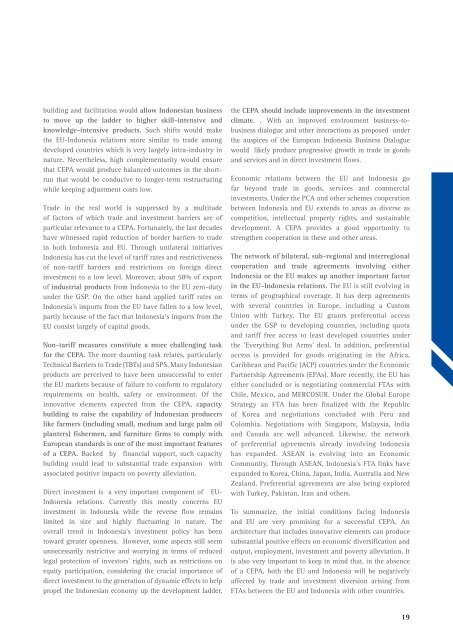Vision Group Report: Invigorating the Indonesia-EU Partnership
Vision Group Report: Invigorating the Indonesia-EU Partnership
Vision Group Report: Invigorating the Indonesia-EU Partnership
Create successful ePaper yourself
Turn your PDF publications into a flip-book with our unique Google optimized e-Paper software.
uilding and facilitation would allow <strong>Indonesia</strong>n business<br />
to move up <strong>the</strong> ladder to higher skill-intensive and<br />
knowledge-intensive products. Such shifts would make<br />
<strong>the</strong> <strong>EU</strong>-<strong>Indonesia</strong> relations more similar to trade among<br />
developed countries which is very largely intra-industry in<br />
nature. Never<strong>the</strong>less, high complementarity would ensure<br />
that CEPA would produce balanced outcomes in <strong>the</strong> shortrun<br />
that would be conducive to longer-term restructuring<br />
while keeping adjustment costs low.<br />
Trade in <strong>the</strong> real world is suppressed by a multitude<br />
of factors of which trade and investment barriers are of<br />
particular relevance to a CEPA. Fortunately, <strong>the</strong> last decades<br />
have witnessed rapid reduction of border barriers to trade<br />
in both <strong>Indonesia</strong> and <strong>EU</strong>. Through unilateral initiatives<br />
<strong>Indonesia</strong> has cut <strong>the</strong> level of tariff rates and restrictiveness<br />
of non-tariff barriers and restrictions on foreign direct<br />
investment to a low level. Moreover, about 58% of export<br />
of industrial products from <strong>Indonesia</strong> to <strong>the</strong> <strong>EU</strong> zero-duty<br />
under <strong>the</strong> GSP. On <strong>the</strong> o<strong>the</strong>r hand applied tariff rates on<br />
<strong>Indonesia</strong>’s imports from <strong>the</strong> <strong>EU</strong> have fallen to a low level,<br />
partly because of <strong>the</strong> fact that <strong>Indonesia</strong>’s imports from <strong>the</strong><br />
<strong>EU</strong> consist largely of capital goods.<br />
Non-tariff measures constitute a more challenging task<br />
for <strong>the</strong> CEPA. The more daunting task relates, particularly<br />
Technical Barriers to Trade (TBTs) and SPS. Many <strong>Indonesia</strong>n<br />
products are perceived to have been unsuccessful to enter<br />
<strong>the</strong> <strong>EU</strong> markets because of failure to conform to regulatory<br />
requirements on health, safety or environment. Of <strong>the</strong><br />
innovative elements expected from <strong>the</strong> CEPA, capacity<br />
building to raise <strong>the</strong> capability of <strong>Indonesia</strong>n producers<br />
like farmers (including small, medium and large palm oil<br />
planters) fishermen, and furniture firms to comply with<br />
European standards is one of <strong>the</strong> most important features<br />
of a CEPA. Backed by financial support, such capacity<br />
building could lead to substantial trade expansion with<br />
associated positive impacts on poverty alleviation.<br />
Direct investment is a very important component of <strong>EU</strong>-<br />
<strong>Indonesia</strong> relations. Currently this mostly concerns <strong>EU</strong><br />
investment in <strong>Indonesia</strong> while <strong>the</strong> reverse flow remains<br />
limited in size and highly fluctuating in nature. The<br />
overall trend in <strong>Indonesia</strong>’s investment policy has been<br />
toward greater openness. However, some aspects still seem<br />
unnecessarily restrictive and worrying in terms of reduced<br />
legal protection of investors’ rights, such as restrictions on<br />
equity participation, considering <strong>the</strong> crucial importance of<br />
direct investment to <strong>the</strong> generation of dynamic effects to help<br />
propel <strong>the</strong> <strong>Indonesia</strong>n economy up <strong>the</strong> development ladder,<br />
<strong>the</strong> CEPA should include improvements in <strong>the</strong> investment<br />
climate. . With an improved environment business-tobusiness<br />
dialogue and o<strong>the</strong>r interactions as proposed under<br />
<strong>the</strong> auspices of <strong>the</strong> European <strong>Indonesia</strong> Business Dialogue<br />
would likely produce progressive growth in trade in goods<br />
and services and in direct investment flows.<br />
Economic relations between <strong>the</strong> <strong>EU</strong> and <strong>Indonesia</strong> go<br />
far beyond trade in goods, services and commercial<br />
investments. Under <strong>the</strong> PCA and o<strong>the</strong>r schemes cooperation<br />
between <strong>Indonesia</strong> and <strong>EU</strong> extends to areas as diverse as<br />
competition, intellectual property rights, and sustainable<br />
development. A CEPA provides a good opportunity to<br />
streng<strong>the</strong>n cooperation in <strong>the</strong>se and o<strong>the</strong>r areas.<br />
The network of bilateral, sub-regional and interregional<br />
cooperation and trade agreements involving ei<strong>the</strong>r<br />
<strong>Indonesia</strong> or <strong>the</strong> <strong>EU</strong> makes up ano<strong>the</strong>r important factor<br />
in <strong>the</strong> <strong>EU</strong>-<strong>Indonesia</strong> relations. The <strong>EU</strong> is still evolving in<br />
terms of geographical coverage. It has deep agreements<br />
with several countries in Europe, including a Custom<br />
Union with Turkey. The <strong>EU</strong> grants preferential access<br />
under <strong>the</strong> GSP to developing countries, including quota<br />
and tariff free access to least developed countries under<br />
<strong>the</strong> ‘Everything But Arms’ deal. In addition, preferential<br />
access is provided for goods originating in <strong>the</strong> Africa,<br />
Caribbean and Pacific (ACP) countries under <strong>the</strong> Economic<br />
<strong>Partnership</strong> Agreements (EPAs). More recently, <strong>the</strong> <strong>EU</strong> has<br />
ei<strong>the</strong>r concluded or is negotiating commercial FTAs with<br />
Chile, Mexico, and MERCOSUR. Under <strong>the</strong> Global Europe<br />
Strategy an FTA has been finalized with <strong>the</strong> Republic<br />
of Korea and negotiations concluded with Peru and<br />
Colombia. Negotiations with Singapore, Malaysia, India<br />
and Canada are well advanced. Likewise, <strong>the</strong> network<br />
of preferential agreements already involving <strong>Indonesia</strong><br />
has expanded. ASEAN is evolving into an Economic<br />
Community. Through ASEAN, <strong>Indonesia</strong>’s FTA links have<br />
expanded to Korea, China, Japan, India, Australia and New<br />
Zealand. Preferential agreements are also being explored<br />
with Turkey, Pakistan, Iran and o<strong>the</strong>rs.<br />
To summarize, <strong>the</strong> initial conditions facing <strong>Indonesia</strong><br />
and <strong>EU</strong> are very promising for a successful CEPA. An<br />
architecture that includes innovative elements can produce<br />
substantial positive effects on economic diversification and<br />
output, employment, investment and poverty alleviation. It<br />
is also very important to keep in mind that, in <strong>the</strong> absence<br />
of a CEPA, both <strong>the</strong> <strong>EU</strong> and <strong>Indonesia</strong> will be negatively<br />
affected by trade and investment diversion arising from<br />
FTAs between <strong>the</strong> <strong>EU</strong> and <strong>Indonesia</strong> with o<strong>the</strong>r countries.<br />
19

















